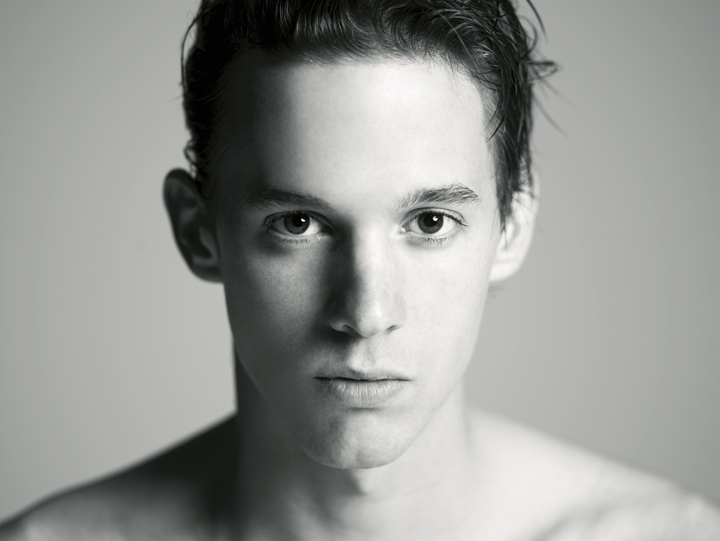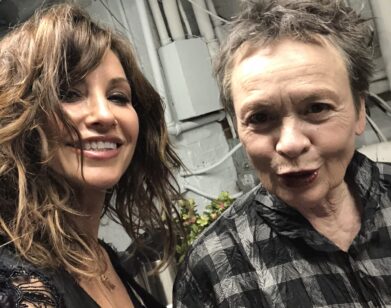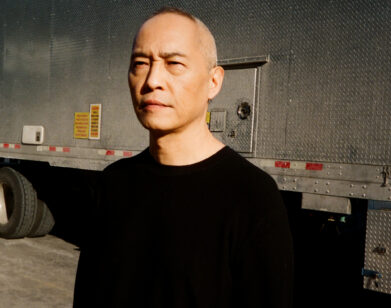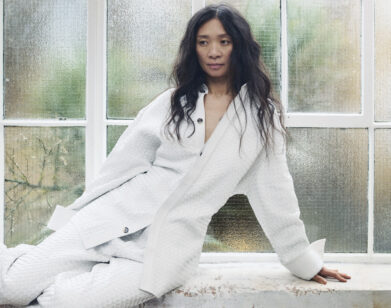Naked in the Void: Nathaniel Brown

PORTRAIT BY NEAL FRANC
Nathaniel Brown is the star of Gaspar Noe‘s Enter the Void, in which he plays a young drug dealer named Oscar who, after his death, watches over his sister (Paz de la Huerta) in a psychedelic vision of Tokyo. The role marks his debut as an actor and, as we learned, it was truly a baptism by fire. Below, Brown talks to us about working with the notorious Noe, his resemblance to his co-star, and why this film will make you want to give up partying.
KRISTINA BENNS: You didn’t have a traditional education, where did you go to high school?
NATHANIEL BROWN: The high school story is funny for me because I didn’t really go to high school. I didn’t go to elementary school, or kindergarten either.
BENNS: Where were you?
BROWN: I grew up all over the U.S. My parents decided in a totally not weird, not super Christian way to homeschool me. The longest that I have ever lived anywhere is four years. Everywhere else was two years, one year, six months. Putting me in school would have been like childhood trauma. I would have be moving from friend to friend. I was home schooled up until I was 16, when I lived in Richmond, Virginia. My parents split up and my dad was like, a Nazi fascist, so he put me in high school. I had already gone to a year of college so it was sort of like going backwards in time. So I ended up going to three weeks of high school before I moved New York.
BENNS: So what was school like for you?
BROWN: School for me was always a colorful jumble of traveling from place to place and learning things very streetwise style, I suppose. My mom and the whole acting thing. My mom raised me heavily on films, and, instead of regular textbooks she’d be like “Well watch this movie, it’s really great!” So I grew up watching a whole lot of really indie American films.
BENNS: Did you have any favorites?
BROWN: I have a lot of favorites. Do you want me to just name some for you? Some of my most memorable movies growing up…George Washington by this director David Gordon Green. All The Real Girls is amazing. I also like sort of weird, long movies like Magnolia. I was always inspired by movies that were really beautifully shot. Photography was always a really big part of my childhood. It was one of the things i thought I was going to be doing as I got older, as opposed to film. Sort of like photography inspired film, film inspired acting.
BENNS: So you live in New York–how did you end up here?
BROWN: I would come up to New York to ride bikes when I was 16 and one time I came up, I think it was September of 2004, and we were riding bikes on the Brooklyn Bridge. A lady came up to me and asked if she could take my photograph. I was young and stupid and I thought it was some old lady hitting on me. I actually thought she was a homeless woman. I didn’t know what a hipster looked like. I thought “Who is this disheveled woman walking up to me, asking me if she can take my photograph and get my phone number?”
BENNS: So of course you said yes.
BROWN: [Laughs] So of course I said yes! and so she called me the next day and said “We have a bunch of stuff for you to do, oh by the way I’m a casting director.” I ended up doing a bunch of modeling things, for maybe a year and a half, in New York. That’s kind of why I moved here.
BENNS: So how did you get involved with Enter the Void?
BROWN: I fell out of contact with the casting director. We hadn’t really spoken for a year, and she called me one day. Every time she called me I would always get kind of excited because that meant she had a job for me. I said “Well look I’m not really interested in doing modeling anymore, I’ve gone on to other things.”
BENNS: Was that really true, or did you just say that?
BROWN: [Laughs] I sort of just said that. And at the same time the film thing was something I wanted to get into and I didn’t know how to get into but I knew modeling wasn’t the way. But she said we actually have a movie we are casting people for and I think you would be perfect in it. It was exciting, but I know how the industry works, of course I wasn’t going to get the part. I went over to do the casting and it was typical model casting “Can you take your shirt off, and tell us what you like to do in your free time?”
BENNS: Did you know what it was for at that point?
BROWN: I had no idea. Then she called me the next day and she said the director like you, it shoots in Tokyo, it’s for the lead role…before she could finish the sentence I said yes. Of course I said yes. It was an excuse to go to Japan for four months, I would be an idiot not to. He had already cast Paz at that time, and he needed someone that mirrored her a little bit, I guess apparently we look similar, I would argue that one….?
BENNS: […]
BROWN: You don’t have to answer that…..[laughs] Actually Paz is beautiful! I can see how we look a lot alike! So I met with Gaspar and he told me he wanted someone that had never acted before and was interested in film. I told him I wanted to be a director, because that has been a goal of mine since I got into film photography. I think that’s why he was excited to use me. As a new actor, you don’t have an ego involved. He wanted someone that was really interested in the technical aspect of making a movie. He was very excited after we talked and he just said “Fine! You’re doing it! Let’s go to Japan in two weeks!”
BENNS: Gaspar has an intense reputation. Were you nervous about meeting him? Did that initial impression of him change?
BROWN: I was nervous only because I saw this photo of him, and I thought “Wow, that guy looks crazy.” [Laughs] Nothing else really scared me that much. That impression has been true of my entire relationship with Gaspar, which has spanned three years. But he is also the nicest, sweetest, kindest person. People think he is this creep, and he hates women, and that couldn’t be further from the truth. Shooting with him was very fun, and exciting. It was terribly hard and scary as well. It was such a huge production and I’m such a big liability to them having never acted before. You have the stress of being in every single shot. It was a lot to handle at first, but I think that was another reason I wanted to do it. Working with huge talent like that. Being that young and having such a big challenge It really changes who you are in a good way.
BENNS: What did Gaspar teach you about acting?
BROWN: I would say that being in Enter the Void was sort of like French art house cinema boot camp. You’re thrown into this massive mix, and with a huge language barrier as well. So you learn the industry from a way that you could never possibly imagine by working in the U.S. Working overseas, there are no labor laws and you’re on set for like 16 hours a day, shooting with this madman, who will keep you naked in a fucking coffin for 12 hours and finally say “Oh we’re not going to use that shot, were going to use the shot of you clothed.” It was very taxing emotionally to be working with Gaspar. It was strenuous in a good way. You have to have very tough skin I think.
BENNS: Paz de la Huerta has a commanding presence. Did she help you in any way on the set?
BROWN: Of course! I think that working with Paz so early on was invaluable to me. And knowing how to develop a relationship with someone else on screen. She was crazy. She likes to be naked a lot. She just really likes to not wear clothes. I think she has helped me in ways I still don’t quite realize. She’s a professional actress. I was just a little twerp just like, “Let’s go party!” That’s kind of how Gaspar works too. She probably felt like this lone ranger out there. She must have been very lonely, to be so professional in the way that she worked. The entire crew, Gaspar included, were just like “This is a really expensive fun party lets take advantage of that.”
BENNS: Has anything you dealt with in the film followed you? Or were you able to distance yourself from the subject matter?
BROWN: The scenes we did were so wide open and so exposing of who you are and so raw and real. It really made you feel sick and disgusting inside. And you kept having to tell yourself that you were making a film and it wasn’t who you really are. It was terrifying that way.
I wouldn’t say it traumatized me, but the main affect hasn’t worn off. I don’t think it will ever leave. It makes you think so hard about what does actually happen after you die. Watching the movie you’ll never want to party again. You’ll never want to be an idiot again for the rest of your life. It really makes you think about your actions in a way that you could never think about without going outside of yourself and looking back. Which is what my character is doing, he is watching people do all of these ridiculous things people do that they think are fun. Things that people do to keep themselves alive, that at the same time are just very detrimental.
BENNS: How much leeway did Gaspar give you within scenes? Did he feel like you were a new actor so he had to give you direction?
BROWN: Even though that was the case, I feel like he wouldn’t have given any more direction than he did, which is very little. He directs the camera. The camera is his actor, which is very frustrating. As a new actor I didn’t know how directors work, but I knew directors probably didn’t work like Gaspar. He would put you on set and say “You guys feel out the scene, the script was only for show. Don’t worry about that. You guys say whatever you want to say. I just need you to be there because I’m going to be on the camera right now.” He would spend hours and hours just toying with the camera and playing with the camera and watching the scene back while you’re on set like “Did I do that right? Was it supposed to be like that?” and he would just come back and be like “Yeah, yeah, you’re fine! You’re good.”
BENNS: So did you ever develop a gauge, did you ever feel comfortable after you finished a scene?
BROWN: I would have to! If I didn’t I would just go crazy. Finally I just thought I’m probably doing this right and if I’m not, he’s not upset so I’ll just say I’m doing it right. I had to develop this confidence on my own because he was really not giving it to me, but that’s just the way that he works. You’re very much a pawn in his game and the camera is totally the star, but it makes for an amazingly beautiful film. A lot of directors are scared to go there, a lot of directors couldn’t imagine doing what Gaspar does.
BENNS: When did you feel most vulnerable while shooting the film?
BROWN: There was this one scene where we were shooting in a real crematorium that had just been used earlier that morning. We went to go shoot there and we had spent weeks making a wax mold of my body. They were supposed to use that, and put that in the coffin and stick that in the incinerator. So I get there on set and Gaspar goes “Nathan, take your clothes off, we have to shoot real soon!” and I was like “Wait, what?” Then I thought “Ah fuck it! I’ll just do it a couple times, this will be an experience.” At the time it was horrifyingly scary, and I thought it was going to be two shoots and we would be done. So I get in, and it was really fucking scary because it was a real incinerator, and it was so quiet inside. You can hear yourself reeling with fear. The whole time i was just thinking “I swear to god if a fucking spider crawls on my leg I’m going to freak out!” We did that three or four times and I’m thinking “OK cool, we’re done.” And, we ended up doing it for 12 hours! And Paz is on the phone with her agent crying saying “You have to come! This is inhumane!” She was very supportive of me actually. She was screaming “Gaspar, stop you can’t do this anymore!” I honestly felt reduced to nothing and inhuman at a certain point. Just mentally raped. Then finally, this is the part that pissed me off; I get out, physically and fucking mentally taxed. Gaspar goes “Alright, put the wax body in now.” And I think he ends up using that take. That’s an example of how it was every single day on set. He would make us run these very emotionally and physically strenuous scenes for hours and hours until we were nothing. We were no more. Then he would be like, “Ok, lets just do it tomorrow.” And its like, you can’t do that to us! We’re really trying here! Always an interesting thing in post production, trying to figure out which scene he had ended up using. Was it one of the scenes where we were like 75 takes in? Or was it the one where we did only did two takes?
BENNS: Do you feel any animosity about that ?
BROWN: Absolutely not. He’s such an innocent little person. It’s almost like an abusive relationship because they’re yelling at you and they’re like “What? I didn’t do anything wrong.” and they kind of like look all golden and you’re like “Oh you’re fine, whatever its fine don’t worry about it.” You know what I mean? When you have a bad relationship and they’re always mad at you, and you can never figure out why? Because there’s no real reason why. Every single time you’re just like “Oh fuck, whatever, you’re a cool guy Gaspar.” And then you have to tell yourself he’s really just working hard to make the most amazing thing he can make. He’s in the same position trying to make an amazing film, it makes you work even harder. It makes you go “Oh I didn’t care for that take one hundred and fifty, lets do ten more.” I’ve developed a relationship with Gaspar that is something very special because he’s a very exciting person.
BENNS: Do you have any fears about the project?
BROWN: No. For me, doing a first film, it was overwhelming the press that was happening. You would be kind of sneaking and reading reviews. But you have to realize it’s not important. I stopped doing that. It would be exciting to read a review from someone I really respected, reading New York Times loved it, then you’re excited that you can bring that to people. But everything else is totally irrelevant, and it’s something I don’t think actors should be involved in at all. It’s hard enough even watching the movie. Surround yourself with the good. I’ve already surrounded myself with enough of the bad.






